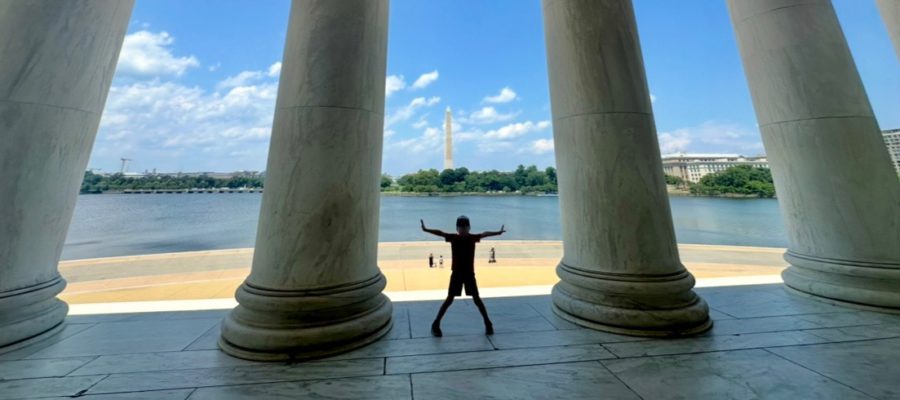I wrote this blog last week, but while I was making corrections to it, an event occurred which made it even more pressing: the murder of Ukranian immigrant Iryna Zarutska on a Charlotte train in North Carolina. As you’ll likely know by now, Iryna was sitting peacefully, scrolling her phone, when DeCarlos Brown plunged a knife into her neck- completely unprovoked. It’s now come to light that Brown was a homeless man with a history of schizophrenia. He was also a violent offender who was released from custody 14 times.
What does this have to do with Washington D.C.? Everything.
Two months ago, my husband and I took our seven-year-old son to Washington D.C. to see his country’s capital and learn its history. We visited the monuments, hit up all the major museums, and toured the Capitol building. It was a vacation bursting with history and discovery, but it was also one of constant fear and vigilance.
The man who pulled down his pants to pee on a wall (and the resulting, “Don’t look over there! Look at Mama”) just after we passed the “Welcome to Washington D.C” sign on our drive in was an accurate sign of things to come. Windows were barred, groups of men loitered on street corners glaring at cars during work hours on week days, and shredded American flags hung from second story windows. Cars and motorcycles brazenly flew through red lights- a terrifying prospect for tourists hoping not to be t-boned in an intersection. Even the ice cream truck driver was menacing, handing my son a small scoop of ice cream and demanding $15 for it with a hard stare only AFTER he’d taken the first bite.
The thing that stood out, however, was the tragic and untenable state of homelessness in the city. The homeless had set up camps every 50 feet or so in all the major thoroughfares, sleeping in walkways, across benches, and on steps. They were camped on every bench outside the White House in the middle of the day. Some were washing clothing in the WWI memorial pool and hanging it all over the surrounding trees.
I want to be clear that the major concern was not their status as poor, unhoused, or inconvenient. It was the obvious drug use and mental illness that was on display in public places, endangering both them and anyone near them.
So many of these people were pacing and yelling loudly at each other, passersby, or nobody at all. A fistfight broke out between two women who were uttering nonsensical words and curses right in front of our pancake joint, scaring my little son (and us) half to death. It was impossible to tell whether the ladies involved were high, mentally unwell, or both.
In front of the Air and Space Museum at midday, a man was passed out inside a shopping cart, his legs extended out beyond the cart with black and eroding feet pointed toward the sky. I thought he might be dead and cautiously approached, but he was clearly alive and in a sleep so deep that it appeared substance induced.
The salient point is that none of these people were begging. They weren’t seeking help, and thus there was a feeling of helplessness on our part, too. They were not safe enough to approach (especially with a child in tow). It didn’t seem appropriate or advisable to offer money, and the sense that they would likely immediately use it for alcohol made that prospect pointless anyway. They seemed to be resigned to this lifestyle and view the open air of downtown and the national mall as their permanent place of residence.
Police were everywhere, yet they drove right past fights between the homeless, didn’t stop those who were raving and yelling in the streets, didn’t make any obvious attempt to clear walkways of bags or people laying across them, and had no guidelines for acceptable places for people to congregate or reside.
The buildings were all being renovated for the 250th anniversary of the nation next year, but the feeling of lawlessness and decay in the city was palpable. On either side of our weeklong vacation, murders and beatings were in the news. After our return, I said to my husband, “I can’t believe Trump isn’t doing something about this. He doesn’t seem like he would tolerate it.”
And then, a few weeks after we left, he did something.
Everyone I’d talked to about our trip was texting me articles or calling me, suspecting I’d greet the news with optimism due to the information I’d relayed to them. They were right. I’m only sorry he didn’t do it sooner.
Many have voiced disapproval or concern about Trump’s move to clean up crime and vagrancy in the city. I doubt that many of these people have visited recently. I also doubt the sincerity of most of these objections (many people seek reasons to fault him before they even understand what actions he’s taken), but some of them I do understand. People want to be sure that the humanity of the homeless is being respected. They want to be sure that the federal government isn’t taking too much power from the states.
Washington D.C. is a unique case because it’s not a state, though. It’s a city that forms the nexus of our federal government, yet it is largely ruled by a small city government which has taken steps to reduce penalties for crime while lawlessness abounds. Because of this unique status, the federal government does have additional powers to step in when necessary, and I think Trump is right to do it now. In its current state, our capital is no longer the jewel of the nation that it should be. It’s not the keeper of our country’s shared history that it should be. It’s not the place to host dignitaries and welcome schoolchildren and visitors to their nation’s capital that it should be.
This is particularly tragic because there is so much good in Washington D.C. The monuments themselves are breathtaking. The museums are largely free so that people can enjoy and learn about their nation. The city’s history is second to none, and it’s where one of the freest and fairest governments in the world hashes out its laws and justice.
In regard to the dignity of the homeless, a key part of the initiative to move them out of these public spaces involves pressuring them to receive help in the form of drug and mental health treatment. In addition, they are being directed toward homeless shelters rather than open air encampments. This will hopefully provide immediate help for some and an impetus to seek change for others. Another result of this will be less crime directed at residents and visitors BY them and also less violence BETWEEN them in territorial disputes.
While in D.C., we decided not to ride the metro because the general feeling in the city wasn’t safe, and we didn’t want to be trapped with our son in an enclosed space. After hearing the tragic news out of Charlotte, I know that choice was right. DeCarlos Brown is not unique, nor is his battle with mental health and the failure of the justice system to identify him as a legitimate threat an isolated problem. Improving public safety will involve deeper changes in the long run, but in the short run, better patrolling and policing will help. Efforts to connect the homeless with mental healthcare will help, too. People shouldn’t fear public transportation. Both the rich and the poor should feel safe when traveling around their cities- and it’s the poor who suffer most when criminality reigns.
During our visit, my husband said to me, “Let’s see everything, because we’re never coming back.”
With the steps Trump’s taken, I feel more optimistic that maybe we’ll both change our minds and visit again in the future. I pray that the city becomes known for its beauty and safety long after Trump is gone. Our founders intended it to be a credit to the American people, and its residents and visitors deserve no less.
Thanks for reading, and don't forget to Click here to Subscribe!“The city, laid out under a regular plan, with broad streets and avenues, and spaces reserved for public buildings, is intended to reflect the permanence and beauty of the federal government, and to be an object of pride to the American people.”
– George Washington, 1793
About the Author

|
Jackie Chea is a blogger from San Antonio, Texas who holds a B.A. in Psychology and an M.A. in Community Counseling from the University of Texas at San Antonio. She writes on political and cultural issues from a conservative, religious standpoint. She lives in the Lone Star State with her husband, Nick, and their 7-year-old son, Lincoln. |


Facebook Comments